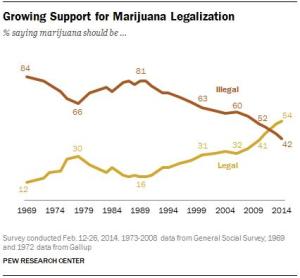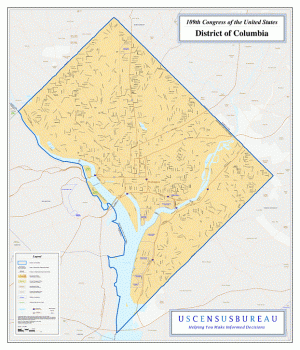A new Pew poll has majority support for marijuana legalization, treatment instead of jail for hard drug users, and getting rid of mandatory minimums. Now, how do we translate that into policy?
Washington, DC, Mayor Vincent Gray has signed a decriminalization bill. Now, Congress must act to stop it within 60 working days or it becomes law. But this is by no means the end of pot politics in the nation's capital.
A national clinical cannabis conference is coming to Portland next month, state legislatures continue to deal with medical marijuana and CBD bills, Colorado wants to crack down on high plant-count patients, and more.
More jail guards gone bad, evidence has gone missing in Alaska, a Georgia cop sells pot from his patrol car, a North Carolina detective working prescription pill diversion diverts some his way, and more.
No marijuana legalization in New Hampshire this year, neurologists recommend cannabis oil for MS, New Mexico pharmacists will start prescribing naloxone, Russian-US drug cooperation is at risk over the Crimea crisis, and more.
Medical marijuana and CBD bills continue moving in state legislatures, Northeastern governors respond to opiates, the Department of Agriculture wants to buy Ukrainian hemp seed, and more.
Garden State municipal prosecutors say legalize it, an Arizona sheriff has to give back medical marijuana seized rom a patient, Colorado wants to crack down on high plant-count patients, Louisiana takes a resolutely last century approach to heroin, Uruguay is going to seriously track its legal weed, and more.
No April Fools' stories here -- the mayor of Washington really did sign a decriminalization bill, the Kentucky legislature really did pass a CBD medical marijuana bill, the US government won't help Honduras shoot down drug planes, and more.
A new Pew Research poll has some surprising and heartening results, Madison (WI) says legalize it, Wisconsin passes a CBD medical marijuana bill, misbehaving cops get noticed, the Russians are griping about the Aghan poppy crop again, and more.
A new national survey released today by the Pew Research Center provides strong evidence that Americans are undergoing a tectonic shift in their views on drug policy. Not only are Americans convinced that marijuana legalization is coming; a majority supports it, and even larger majorities support a fundamental realignment of our drug policies away from the criminal justice system and toward treatment instead of punishment for hard drug users.

rethinking...
Among the key findings of the report was that more than six in ten Americans (63%) say that state governments moving away from mandatory prison terms for drug law violations is a good thing, while just 32% say these policy changes are a bad thing. This is a substantial shift from 2001 when the public was evenly divided (47% good thing vs. 45% bad thing). The majority of all demographic groups, including Republicans and Americans over 65 years old, support this shift.
Similarly, two-thirds (67%) say the government should focus more on providing treatment for people who use drugs like cocaine and heroin. Just 26% think the focus should be more on prosecuting people who use such drugs. The poll did not ask if hard drug users should just be left alone barring harm to others.
"Given that the vast majority of Americans don't think people should be prosecuted for drug possession, it's time to ask the question: Why are we still arresting people for nothing more than drug possession?" asked Ethan Nadelmann, executive director of the Drug Policy Alliance.
More than 1.5 million people are arrested in the U.S. every year for a drug law violation. The vast majority -- more than 80% -- are arrested for possession only. Roughly 500,000 Americans are behind bars on any given night for a drug law violation, including more than 55,000 people in state prisons for simple drug possession.
"There's a new consensus that mandatory minimums are no longer appropriate for drug and other nonviolent offenders," said Nadelmann. "This is reflected and confirmed by the growing bipartisan support for rolling back and ending such laws."
The passage of the
Fair Sentencing Act in 2010, which reduced, but did not eliminate, sentencing disparities between federal crack and powder cocaine offenders is one example of the emerging reformist consensus. Sentencing reform measures passed by around half the states in the past decade, which have resulted in an absolute decline in state prison populations, have also proven popular with a citizenry increasingly tired of drug war without end.
And President Obama and Attorney General Holder have continued to make a series of moves over the past year indicating that they are serious about reducing mass incarceration and fixing the criminal justice system, including a call from Holder to federal prosecutors to not use mandatory minimum charges if they don't have to.
Likewise, in an otherwise-bitterly-divided Congress, legislators from both sides of the aisle are pushing to reform mandatory minimum drug laws. The reforms are supported by a group of Senators who can only be described as strange bedfellows: Senators Mike Lee (R-Utah), Rand Paul (R-Kentucky), Jeff Flake (R-Arizona), Ted Cruz (R-Texas), Patrick Leahy (D-Vermont), Dick Durbin (D-Illinois), Carl Levin (D-Michigan) and Sheldon Whitehouse (D-Rhode Island).
At the same time, the Pew poll illuminates what has been a major shift in attitudes on whether the use of marijuana should be legal. As recently as four years ago, about half (52%) said they thought the use of marijuana should not be legal; 41% said marijuana use should be legal. Today those numbers are roughly reversed -- 54% favor marijuana legalization while 42% are opposed. Just 16% say it should not be legal for either medical or recreational use.
And no matter respondents' personal feelings for or against marijuana legalization, 75% of them think it is inevitable.
Also, more than two-thirds (69%) said that alcohol was more harmful than marijuana for individuals. And nearly the same number (63%) said alcohol was more harmful to society.
"Leadership is needed to overcome the institutional lethargy and vested interest that have stymied meaningful police and sentencing reform," said David Borden, executive director of StoptheDrugWar.org (publisher of this newsletter). "The policies are counterproductive, and too many otherwise law-abiding people are getting caught up in the justice system because of them."
"It is good to know that despite the DEA's best efforts the American people are getting scientifically accurate information about marijuana, and the fact that it is objectively less harmful than alcohol to both individual health and society at large. The increase in support since last year's poll shows that more and more Americans understand it's simply bad public policy to steer adults toward alcohol by punishing those who prefer marijuana as a less harmful alternative," said Dan Riffle, director of federal policies for the
Marijuana Policy Project.
"Now that three-quarters of Americans understand taxing and regulating marijuana is inevitable, the writing is on the wall. Congress needs to read it and move forward with legislation allowing states to choose more effective policies without federal interference," Riffle added.
While Nadelmann also greeted the poll results, he warned that it should not be used as fuel for even more, if softer, expansion of the criminal justice system.
"It's good to see yet another poll confirm the results of other state and national polls showing majority support for legalizing marijuana," he said. "And it's nice to see that Americans overwhelmingly support treatment-instead-of-incarceration. But it's important to recognize that there has been overwhelming support for treatment-instead-of-incarceration for well over a decade now -- and that we've reached the point where the public needs to be better educated about the benefits of providing treatment outside the criminal justice system rather than within and through it. It would be a shame if this latest poll result were used to promote drug courts and other coercive, abstinence-only programs rather than meaningful treatment in the community."
back to top
Washington, DC Mayor Vincent Gray Monday signed the marijuana decriminalization bill passed last month by the city council. It's not quite a done deal yet, though -- Congress has 60 working days to object, but to stop the bill, it must pass a resolution blocking it, and President Obama must sign it. So it appears likely that the nation's capital will have decriminalized pot possession by the time Congress leaves town for the August recess.
"DC lawmakers heard loud and clear the public's demand to end marijuana arrests and passed one of the strongest decriminalization laws in the whole country, said Grant Smith, policy manager with the
Drug Policy Alliance. We don't expect members of Congress to object to saving taxpayer dollars and advancing racial justice here in the nation's capital."
The decriminalization bill, the Marijuana Possession Decriminalization Amendment Act of 2014 (Council Bill 20-409) makes possession of less than an ounce of marijuana a civil offense punishable by a fine of only $25 (the cheapest of any decriminalization state). It also explicitly prohibits police from using the smell of marijuana as a pretext for stopping and searching people.
The bill advanced through the DC political process on a wave of concern that marijuana laws in the nation's capital were being enforced in a racially discriminatory fashion and is seen by council members and advocates alike as a model for reducing racial disparities in the criminal justice system.
Last July, the American Civil Liberties Union released The War on Marijuana in Black and White, which found that black people in the District are eight times more likely to be arrested for marijuana possession than whites, and the Washington Lawyers' Committee on Civil Rights and Urban Affairs released Racial Disparities in Arrests in the District of Columbia, 2009-2011, which found that blacks accounted for nine out of 10 drug arrests in the District.
Those grim realities were at the forefront as a broad spectrum of DC faith, community, and advocacy groups praised Mayor Gray's signing of the bill.

DC Mayor Vincent Gray has signed the decrim bill. (mayor.dc.us)
"Passage of this law gets to the unspoken imbalances in our justice system for people of color and it is the voice of the people who ensured its passage," said Collective Power, a grassroots alliance of District residents concerned about the disproportionate
criminalization and discrimination of communities of color. "The District of Columbia must be at the forefront of decriminalizing 'being black and brown' and this is the start."
"The passing of the decriminalization marijuana bill is the first step in the right direction to dismantling the immoral war on drugs that has devastated communities of color," said Rev. Kelly D. Wilkins with the Covenant Baptist United Church of Christ.
"Although I do not advocate or condone the use of marijuana, I support this bill because far too many of our people have been targeted, locked up, thrown away and placed outside of our society due to a small amount of marijuana, said Reverend George C. Gilbert, Jr. with Holy Trinity United Baptist Church.
"This bill is one of the first measures to address racial profiling in drug arrests, both procedurally and substantively. We are confident that Congress shares the District's concerns about disparities in enforcement and the disturbing trends we are seeing nationwide," said Patrice Amandla Sulton with the NAACP DC Branch.
"This historic legislation exists because DC residents and their leaders decided to change an ugly reality: Black people are stopped, searched, and arrested under marijuana prohibition far more than whites, when both groups use the drug at similar rates," said Seema Sadanandan, Program Director at the ACLU of the Nation's Capital.
"I've talked to hundreds of people in the District's black and brown communities who have been stopped and searched because police officers claimed they smelled marijuana, only to find no evidence of the drug whatsoever,"
Sadanandan continued. "Children on their way home from school, parents on their way to work -- marijuana odor has become the flimsy excuse for treating people of color like criminals. With this decriminalization legislation, we will take a critical step toward ending the racial profiling of entire communities."
If and when the law goes into effect, DC will join 17 states that have already decriminalized small-time marijuana possession. But passage of the decriminalization bill into law is by no means the end to marijuana politics in the District -- in fact, it could be just a first step on a path toward outright legalization, either through the council or through the initiative process.
Before the council right now is a full-blown marijuana legalization bill, Council Bill 20-466, which has been sitting in the Judiciary and Public Safety Committee since it was introduced last fall by Councilmember David Grosso.
And waiting in the wings is the DC Cannabis Campaign, whose marijuana legalization initiative has just been approved for signature-gathering.
"I congratulate Mayor Gray for signing this practical reform that should result in fewer people being burdened with a trip to the courthouse for small amounts of marijuana. More people than ever are hopeful the mayor will next support full legalization," said the campaign's chairman, Adam Eidinger.
Given time limitations, Eidinger and the DC Cannabis Campaign can't sit around waiting for the city council to act or for a new mayor to be chosen. They need to start gathering signatures now if they are to try to qualify for the November ballot. They only have until July 7 to come up with 25,000 valid voter signatures, but if they do, the passage of the decriminalization bill may be a significant victory that ends up forgotten in the accelerating rush toward repealing pot prohibition.
back to top
A national clinical cannabis conference is coming to Portland next month, state legislatures continue to deal with medical marijuana and CBD bills, Colorado wants to crack down on high plant-count patients, and more. Let's get to it:
NationalLast Friday, the American Academic of Neurology endorsed the use of medical marijuana for MS. The group recommended oral cannabis extract to help ease spasticity symptoms and pain in patients with multiple sclerosis, along with other therapies, in new, evidence-based complementary and alternative medicine (CAM) recommendations.
On Monday, the announcement went out for the Eighth National Clinical Conference on Cannabis Therapeutics. The state-of-the-art conference, cosponsored by Patients Out of Time and the University of California-San Francisco School of Medicine, will take place in Portland, Oregon, on May 8-10. Click on the link for more details and registration information.
Arizona
On Monday, the US Supreme Court refused to overturn an Arizona court ruling ordering a sheriff to return medical marijuana seized from a patient. Yuma County had refused to return medicine seized from a California woman who was authorized to use medical marijuana. She sued, and Arizona courts agreed her medicine must be returned. Now, the Supreme Court has declined to intervene in the case.
On Wednesday, demonstrators protested the blocking of a bill that would allow approved PTSD research to go forward. Supporters of medical marijuana research are trying to put state Sen. Kimberly Yee in the hot seat because the Senate Education Committee chairwoman is blocking a bill that would allow monies collected under the state's medical marijuana program to be used to help fund an approved trial of medical marijuana for treating PTSD in veterans. The bill is House Bill 2333, which has already passed the House.
California
Last Wednesday, the state Supreme Court upheld local cultivation bans. The state Supreme Court denied review of an appellate court decision upholding the rights of local governments to completely ban personal cultivation by medical marijuana patients. The ruling came in a lawsuit sponsored by California NORML, which had asked the high court to "depublish" the decision. "We are deeply disappointed by the court's decision," said CANORML Director and Prop 215 coauthor Dale Gieringer, "They have effectively undermined Prop. 215's stated purpose 'to ensure that seriously ill Californians have the right to obtain and use marijuana for medical purposes.'"
Last Thursday, the Fresno city council appointed a committee to review medical marijuana growing. Council President Steve Brandau appointed a temporary panel charged with finding solutions to a problem that pits seeking to grow their medicine against neighbors who don't like it. The move comes after protests in the wake of the council's move last month to ban indoor grows.
On Tuesday, Los Angeles reported that 450 dispensaries had filed renewals to pay city business taxes next year. But under the Proposition D dispensary regulation measure passed by voters last year, only 140 dispensaries are allowed to operate in the city. The city has been attempting to force non-allowed dispensaries out of business, but it looks like they aren't going without a fight and are willing to pay taxes to the bitter end.
Colorado
Last Thursday, the Department of Public Health said it wants to limit high plant-count patient and caregiver grows. Currently, caregivers can serve more than five patients by applying for a "medical necessity" waiver from the department, and plant counts can be increased from just six with a doctor's recommendation, which is often the case with patients who make their own concentrates or edibles. Department officials said they would ask the legislature to draft new laws to tighten the "loopholes," but will seek public input first. Some patient advocates are not happy.
Florida
Last Thursday, a Senate committee approved a CBD medical marijuana bill. A bill that would allow doctors to prescribe "non-euphoric" marijuana strains for seizure or cancer patient passed the Senate Criminal Justice Committee. Senate Bill 1030 is now headed for the Appropriations Committee. A companion bill is also moving in the House.
Kentucky
Last Thursday, the House approved a CBD medical marijuana bill. The measure, Senate Bill 124, passed on a unanimous vote. The bill then went back to the Senate, which had already approved it, for approval of slight changes.
On Monday, the Senate gave final approval to Senate Bill 124. The bill would allow Kentuckians to use cannabidiol in two cases: a prescription from a doctor at the University of Kentucky or the University of Louisville research hospitals or a trial from the US Food and Drug Administration. The bill will become law unless Gov. Steven Beshear (D) vetoes it.
Maryland
Last Thursday, the Senate approved a full-blown medical marijuana bill. The measure, Senate Bill 923 now goes to the House, where a similar bill has already been passed. The bill would allow seriously ill residents suffering from certain qualifying conditions to use medical marijuana if their doctors recommend it. Possession limits and regulations governing cultivation and dispensary facilities would be determined by the state prior to implementation.
Massachusetts
On Monday, the Massachusetts Municipal Association released a report with recommendations for local governments trying to navigate the state's new medical marijuana law. The report, written by MMA legislative analyst J. Catherine Rollins, touches on the legal right cities and towns have to regulate medical marijuana dispensaries and grow centers.
Missouri
On Tuesday, a Senate panel heard testimony on a CBD medical marijuana bill. The Senate General Laws Committee heard the testimony, but did not vote on the bill. The measure, Senate Bill 951, is not expected to pass this session.
Nevada
Last Friday, the Legislative Commission gave final approval for medical marijuana growing, processing, and selling rules. The regulations spell out requirements for testing laboratories, cultivation operations, processing facilities and dispensaries. Although dispensaries are legal in Nevada as of this week, it could be late this year before any are actually open for business and selling medicine to patients.
New York
Last Saturday, Gov. Cuomo and legislative leaders failed to include medical marijuana in their state budget proposal, greatly lessening the chances for passage of the Compassionate Care Act this year. Advocates are calling on the Senate to act on the measure, which has passed the Assembly repeatedly in previous years, only to be bottled up in the Senate.
Oregon
Last Thursday, the Bandon city council approved a 120-day moratorium on dispensaries. The council said the move gives the city time to plan for siting and regulating such facilities. The ordinance also declared an emergency so the moratorium would go into effect immediately. Under a new state law allowing dispensaries, localities can ban them, but for no more than one year.
Last Friday, the Oregon Health Authority reported that 22 dispensaries have been approved statewide so far. Portland has the most registered shops with nine, followed by Eugene with five. Bend and Salem now have two each, while Springfield, Corvallis and Hermiston all have one. One shop declined to have its location disclosed. The agency has processed 102 of 301 applications submitted since March 3. A total of 41 applicants have been granted provisional licenses until their security systems are in place, and 39 applications have been denied. Reasons for denial include incomplete information or locations within 1,000 feet of a school or another dispensary.
On Monday, the Oregon Health Authority issued revised rules for marijuana edibles. Earlier draft rules had banned all edibles, but under the new ones, only edibles "attractive to minors" are forbidden. The agency revised the rules after receiving hundreds of complaints.
On Tuesday, Lane County commissioners voted down a proposed yearlong dispensary moratorium. The measure failed 1-4 after numerous people spoke out against it. Lane County followed the town of Veneta in considering but ultimately dropping a proposed moratorium in recent weeks. The Lane County communities of Florence and Junction City have enacted one-year bans, while city leaders in Springfield, Creswell, Coburg and Cottage Grove are still weighing the issue. The Eugene City Council has not scheduled a discussion.
Puerto Rico
On Monday, the Senate began debating a medical marijuana bill. Advocates of the move argue legalization will dramatically cut crime and legal costs on the Caribbean island, but some legislators and health officials are wary.
Wisconsin
On Tuesday, the legislature approved a CBD medical marijuana bill. The measure, Assembly Bill 726, was approved by the state Senate on the last day of the session. It had already passed the Assembly and now goes to the governor's desk.
[For extensive information about the medical marijuana debate, presented in a neutral format, visit MedicalMarijuana.ProCon.org.]
back to top
More jail guards gone bad, evidence has gone missing in Alaska, a Georgia cop sells pot from his patrol car, a North Carolina detective working prescription pill diversion diverts some his way, and more. Let's get to it:
In Barrow, Alaska,
news came last Friday that drugs and money are missing from the North Slope Borough Police Department evidence room. The stuff actually turned up missing a year ago, with evidence bags containing cocaine and cash sliced open and the contents removed. Now, an internal investigation is underway.
In Greenville, North Carolina, a Pitt County sheriff's detective was arrested last Monday for stealing drugs from a pharmacy and the sheriff's office prescription drug drop-off box. Detective Tyler Bryan had worked closely with doctors and a pharmacist to help stop the diversion of prescription drugs, but the pharmacy complained that he would take large amounts of narcotic pain medication and say he would turn the medicine in to the drop box. He is charged with doctor shopping for Oxycontin. He has also now been fired.
In Globe, Arizona, a Gila County Jail guard was arrested last Wednesday on charges he was smuggling contraband to inmates. Brittany Gonzales, 28, had just a month on the job when someone snitched her out and she went down after a brief investigation. She is facing felony promoting prison contraband charges.
In Indianapolis, an Indianapolis Metropolitan Police officer was arrested last Thursday following an internal affairs investigation into evidence mishandling. Patrolman Cory Owensby was put on leave last fall when investigators were tipped off that he had failed to turn over evidence in at least five cases, including marijuana, prescription pills, drug paraphernalia, and a steel axe. He was indicted on five felony counts of official misconduct. He also face five misdemeanor counts of criminal conversion and three misdemeanor counts of false informing. He has been released on his own recognizance.
In Lithonia, Georgia, a former Newton County deputy was sentenced last Thursday to five years in federal prison for selling marijuana from his marked patrol car while in uniform. Darrell Mathis, 41, went down after selling weed to both an FBI snitch and an undercover FBI agent, and had a pound with him when he was busted. He copped to one count of possessing a firearm during a drug transaction.
In Jersey City, New Jersey, a former state prison guard was sentenced last Friday to seven years in prison for smuggling heroin and marijuana into the prison where he worked. Bobby Singletary, 55, had worked at the Adult Diagnostic and Treatment Center satellite unit for sex offenders in Kearny. He was found guilty of conspiracy, official misconduct, and bribery for a three-year smuggling operations where inmates paid for drugs by wiring money to conspirators on the outside.
back to top
No marijuana legalization in New Hampshire this year, neurologists recommend cannabis oil for MS, New Mexico pharmacists will start prescribing naloxone, Russian-US drug cooperation is at risk over the Crimea crisis, and more. Let's get to it:

Coat of arms for the Russian Federal Drug Control Service. It's getting the cold shoulder from the US these days. (kremlin.ru)
California PPIC Poll Has Support for Legalization at 53%. A new Public Policy Institute of California poll has support for marijuana legalization at 53% among registered voters, with 60% of independents and 57% of Democrats in favor. On the other hand, 62% of Republicans were opposed.
New Hampshire House Kills Legalization Bill. A bill to legalize marijuana in New Hampshire died in the House yesterday on a 192-140 vote. The House had passed the bill once in January, but support has eroded since then. The measure was House Bill 492.
Medical Marijuana
California Supreme Court Ruling Upholds Local Cultivation Bans. The state Supreme Court Wednesday denied review of an appellate court decision upholding the rights of local governments to completely ban personal cultivation by medical marijuana patients. The ruling came in a lawsuit sponsored by California NORML, which had asked the high court to "depublish" the decision. "We are deeply disappointed by the court's decision," said CANORML Director and Prop 215 coauthor Dale Gieringer, "They have effectively undermined Prop. 215's stated purpose 'to ensure that seriously ill Californians have the right to obtain and use marijuana for medical purposes.'"
American Academy of Neurology Recommends Cannabis Oil for Multiple Sclerosis. The American Academy of Neurology is recommending oral cannabis extract to help ease spasticity symptoms and pain in patients with multiple sclerosis, along with other therapies, in new evidence-based complementary and alternative medicine (CAM) recommendations. Click on the link for more details.
Kentucky CBD Medical Marijuana Bill Passes House. The House voted 98-0 Wednesday to approve a bill allowing the use of high CBD cannabis oil to treat seizures in children. Senate Bill 124 has already passed the Senate, but must return there for approval of minor changes made in the House version of the bill.
Heroin
Kentucky Heroin Bill Wins House Committee Vote. A bill that would address heroin use with a combination of increased penalties for trafficking and harm reduction measures for users squeaked through the House Judiciary Committee on a one-vote margin. But Senate Bill 5 faces an uncertain future; civil libertarians oppose some law enforcement provisions, while some elected officials oppose some harm reduction provisions.
Harm Reduction
New Mexico Pharmacists to Start Prescribing Overdose Reversal Drug. New Mexico pharmacists are the first in the nation to be certified to prescribe the overdose reversal drug naloxone (Narcan). The first batch of 60 pharmacists have been trained and certified by the state Health Department. New Mexico law allows pharmacists to prescribe certain drugs.
Law Enforcement
Detroit Drug Sweep Nets Arrests, Not Many Drugs. Yesterday's sweep of poor Detroit neighborhoods, the most recent in a series of mass drug sweeps, yielded 44 felony and 19 misdemeanor arrests, two grams of cocaine, three grams of heroin, 25 pounds of marijuana, 4,000 prescription pills, $14,500 in cash, and about two dozen illegal weapons. Similar raids in November, December, and February have netted similar results.
International
US Drug Official Rejects Invitation from Russian Counterpart. Deputy director of the Office of National Drug Control Policy (ONDCP) Michael Botticelli has rejected an invitation to meet on drug issues in Moscow, citing the ongoing Crimea crisis. "Given the continued violation of the sovereignty and territorial integrity of Ukraine by Russia, we are suspending some bilateral discussions with the Russian Federation, including this one," Rafael Lemaitre, ONDCP communications director, told Itar-Tass news agency. Russian Federal Drug Control Service chief Viktor Ivanov is one of the Russia political figures sanctioned by the US as a result of the Crimea conflict.
International Ibogaine Providers Conference in South Africa in May. The 4th International Ibogaine Provider's Conference will take place between May 7 and 10 in Durban, South Africa. Discussions will cover a broad spectrum of topics, from developments in research, treatment protocol, and legislation. The featured topic of interest for the conference will be the sustainability of tabernanthe iboga, the implications of ibogaine treatment on regional practices in Africa, and ways that international collaborations can help to ease the effects of demand on iboga's availability. Click on the link for more details and registration information.
back to top
Medical marijuana and CBD bills continue moving in state legislatures, Northeastern governors respond to opiates, the Department of Agriculture wants to buy Ukrainian hemp seed, and more. Let's get to it:

Massachusetts Gov. Deval Patrick (D) declares a public health emergency to deal with opiate use. (mass.gov)
Alaska Poll Has Legalization Initiative in Narrow Victory. A new Alaska House Majority Caucus poll suggests that the marijuana legalization initiative there should win at the polls in August, but it will be close. The poll had support for the initiative at 52%, with 44% opposed and only 4% undecided. Click on the poll link for cross-tabs and top lines.
New Jersey Governor Christie Rejects Legalization, Raises "Gateway" Specter. During Gov. Chris Christie's (R) "Ask the Governor" radio program Thursday, Christie rejected legalization in response to a listener's question. "Mike, I love you baby, but it ain't happening, not while I'm governor," Christie said to the caller. "I don't believe that legalizing an illegal drug for purposes of governmental profit is something that we should be doing. I believe that this is a gateway drug into other more serious drugs, I think it sends a wrong message to our kids and I don't think it makes anybody a better or more productive person," he said.
Vermont Lawmakers Want Marijuana Tax Revenue Study. Vermont lawmakers were expected to offer an amendment to a tax bill passed by the House Thursday to include a study on the revenue effects of legalizing marijuana. The proposed amendment would require the Joint Fiscal Office to report back to the House Ways and Means Committee and the Senate Finance Committee on specific revenue projections. The amendment calls on the Joint Fiscal Office to use the Colorado tax model for purposes of the report.
Medical Marijuana
Study Finds Marijuana Medical Access Not Linked to Crime Increases. A new study from University of Texas-Dallas criminologist Robert Morris finds no link between violent crime and the legalization of medical marijuana. "We're cautious about saying, 'Medical marijuana laws definitely reduce homicide.' That's not what we're saying," said Morris. "The main finding is that we found no increase in crime rates resulting from medical marijuana legalization. In fact, we found some evidence of decreasing rates of some types of violent crime, namely homicide and assault."
Colorado Health Department Wants to Restrict Caregiver, Patient Grows. The state Department of Public Health wants to limit the number of patients caregivers can serve and put a cap on the number of plants patients or caregivers can grow. The agency says it will ask legislators to craft new laws, but is still moving forward with its proposed rule change. Some patient activists are viewing this as a power grab by state regulators.
Maryland Senate Passes Medical Marijuana Bill. The state Senate approved a full-blown medical marijuana bill Thursday. Senate Bill 923 now goes to the House, where a similar bill has already been passed.
Mississippi House Approves CBD Medical Marijuana Bill. The House voted 112-6 Thursday to approve a measure that would allow the limited use of CBD cannabis oil as a medical treatment. House Bill 1231 is not quite done in the House yet, though. It was held over on a motion that could allow for more debate.
Florida Senate Committee Approves CBD Medical Marijuana Bill. A bill that would allow doctors to prescribe "non-euphoric" marijuana strains for seizure or cancer patienta passed a Senate committee Thursday. Senate Bill 1030 passed out of the Criminal Justice Committee and is now headed for the Appropriations Committee. A companion bill is also moving in the House.
Hemp
Ag Secretary Says US Seeking to Buy Ukraine Hemp Seed. US Secretary of Agriculture Tom Vilsack said Thursday that the US is looking to buy hemp seed from Ukraine in a bid to bolster the East European country's economy. "We are now involved in trying to figure out ways in which we might be able to use the industrial hemp seeds that are created in the Ukraine in the US," Vilsack told reporters. Ukraine is one of the world's largest hemp seed producers, and Vilsack said its hemp seed doesn't contain any THC, "so it probably does not run afoul of any of our drug laws."
Drug Policy
Maine Governor's Anti-Drug Bill Gets Some Balance, But ACLU Still Opposes It. Maine Gov. Paul LePage's (R) law enforcement-heavy bill to deal with drug problems in the state has been amended to cut the number of new drug agents, prosecutors, and judges and increase funding or drug treatment programs. The changes to Legislative Document 1811 came in the House Criminal Justice and Public Safety Committee and could generate enough Democratic support to pass them, but the ACLU of Maine still says the measure should be defeated.
Massachusetts Governor Declares Public Health Emergency on Opiates, Calls for All First Responders to Have Overdose Reversal Drug. Gov. Deval Patrick declared a public health emergency Thursday to combat the growing abuse of opiates, directing that all the state's police, firefighters, and other emergency personnel be equipped with a drug that can quickly reverse heroin overdoses. Using his emergency powers, Patrick told the Department of Public Health to make Narcan available immediately to all first responders, as well as more accessible to families and friends of drug abusers. Narcan, the brand name for naloxone, halts overdoses almost instantly. Unfortunately, however, the state will also prohibit the sale of Zohydro, an opioid pain reliever approved last year by the FDA.
International
"Women, Drug Policy, and Incarceration in the Americas" Events in DC, NYC Next Week. The Harm Reduction Coalition, the International Drug Policy Consortium, the Washington Office on Latin America, the Permanent Mission of Uruguay to the UN, and the Inter-American Commission of Women will be discussing women, drug policy, and imprisonment at meetings Monday in Washington, DC, and Thursday at the UN in New York City. Click on the links for details and/or to RSVP.
Canada's Alberta Arbitration Board Rejects Random Drug Testing. The Alberta Arbitration Board sided with union workers against Suncor Energy after the union filed a grievance over the company's random drug testing policies. The board ruled that the company failed to demonstrate "a significant problem or legitimate safety risk" to justify random alcohol testing and that its use of urinalysis to do drug testing "failed to identify current impairment." While the tests did find employees who had recently used drugs, "this did not meet the threshold of a legitimate business interest which would justify the significant intrusion into employees' privacy."
Clashes as Bolivians Protest New Anti-Drug Base in Coca-Growing Region. Coca growers blocked roads and hurled stones at police, who responded with volleys of tear gas, as protestors agitated against a new anti-drug military base being constructed near the Chapare, the country's main coca-growing region. Local leaders said people feared an increased law enforcement presence would lead to violence and abuses. The European Union is financing the base at a cost of $1.3 million.
back to top
Garden State municipal prosecutors say legalize it, an Arizona sheriff has to give back medical marijuana seized rom a patient, Colorado wants to crack down on high plant-count patients, Louisiana takes a resolutely last century approach to heroin, Uruguay is going to seriously track its legal weed, and more. Let's get to it:

This much heroin could get you a two-year mandatory minimum sentence under a bill being considered in Lousiana (wikimedia.org)
New Jersey Prosecutors Say Legalize It. The New Jersey State Municipal Prosecutors Association has come out in favor of legalizing marijuana possession. The support of the prosecutors association comes as two bills were introduced this month in the legislature. The board of trustees of the municipal prosecutors association on February 21 voted to endorse legalization, said its president, Jon-Henry Barr, who is municipal prosecutor in Kenilworth and Clark.
Poll Shows Virginians Split on Legalization, Strongly Favor Medical Marijuana. A new Quinnipiac poll has Virginians narrowly opposed to legalization, with 46% in favor and 48% opposed. Medical marijuana fares much better, with support at 84%.
Wisconsin Decriminalization Bill Filed. Rep. Evan Goyke (D-Milwaukee) and 10 Democratic cosponsors have introduced a decriminalization bill, Assembly Bill 891. It has been referred to the Assembly Committee on Criminal Justice, but is not expected to go anywhere.
Wisconsin's Dane County (Madison) Votes Tomorrow on Legalization Advisory Referendum. Voters in Dane County, Wisconsin, will vote tomorrow on whether to approve an advisory referendum calling for marijuana legalization. The question was put on the ballot by County Board member Leland Pan.
Vermont Legislature Legalization Debate Killed. An effort to debate a proposal to study the impact of legalization on state revenues died in the state House. The effort came in an amendment to a miscellaneous tax bill from Rep. Kristina Michelsen (D-Hardwick), but was blocked when Rep. Thomas Koch (R-Barre Town) asked House Speaker Shap Smith to rule on whether it was germane. He ruled it wasn't.
Hundreds Rally for Marijuana Reform in Harrisburg. Supporters of medical marijuana, hemp, and decriminalization rallied by the hundreds at the Pennsylvania state capitol in Harrisburg Monday. They called it the Keystone Cannabis Reform Rally.
Medical Marijuana
US Supreme Court Denies Arizona County's Appeal; Sheriff Must Give Back Seized Medical Marijuana. The Supreme Court has refused to overturn Arizona court rulings ordering the Yuma County sheriff to return marijuana that was seized from a woman with a California medical marijuana authorization honored by Arizona.
Oregon Has Now Approved 22 Dispensaries. The Oregon Health Authority reported 14 more dispensaries had been approved by late Friday, on top of the eight approved the previous week.The agency has processed 102 of 301 applications submitted since March 3. A total of 41 applicants have been granted provisional licenses until their security systems are in place, and 39 applications have been denied. Reasons for denial include incomplete information or locations within 1,000 feet of a school or another dispensary.
Nevada Dispensary Rules Finalized. The Legislative Commission approved rules for growing, processing, and selling medical marijuana Friday. Nevada voters approved medical marijuana in 2000 but patients have had no legal way to acquire it other than to grow it. A law approved by the 2013 legislature and signed by Gov. Brian Sandoval set up a taxing and distribution system to make it accessible to patients. It could be late this year or early 2015 before medical pot is available for purchase.
California Federal Court Judge to Hear Motion on Declaring Unconstitutional Marijuana's Schedule I Classification. For the first time, a federal judge has granted a hearing on a motion to declare unconstitutional the continued classification of marijuana in Schedule I. The evidentiary hearing is currently set for June 2 before Federal District Court Judge Kimberly Mueller in Sacramento.
Colorado Health Officials Warn of Crackdown on High Plant-Count Patients. Beginning today, the state Health Department will send out letters to doctors who recommended that patients be allowed to grow elevated plant counts and the patients who benefit, requiring them to provide more documentation on the need for the extra plants. The department also unveiled a proposed bill that would strictly limit medical-marijuana caregivers -- people who grow cannabis for patients who can't grow for themselves -- to serving only five patients and growing no more than six plants per patient. Caregivers can currently apply for a waiver to serve more than five patients. The proposals did not go over well with medical marijuana supporters, with Health Department spokesmen being cursed at and called "fascists" in response.
Massachusetts Municipal Association Releases Report on State Medical Marijuana Law. The Massachusetts Municipal Association has released a report on the state's medical marijuana law, offering several suggestions for local officials trying to navigate it. The report, written by MMA legislative analyst J. Catherine Rollins, touches on the legal right cities and towns have to regulate medical marijuana dispensaries and grow centers. Municipalities, Rollins said, have the power to create zoning bylaws, ordinances, special permits or host community agreements.
Drug Testing
West Virginia Governor Signs Mining Industry Drug Test Reporting Bill. Gov. Earl Ray Tomblin (D) has approved a bill requiring employers in West Virginia's mining industry to report all positive drug and alcohol tests to the Office of Miners' Health, Safety and Training. Prior to this law, which takes effect immediately, mine industry employers were only required to submit test results to the state if a miner was fired. Employers must notify the administration within seven days if an employee tests positive, refuses a urine sample, or has submitted an adulterated sample. Suspect employees will be suspended from work until they appear before a board of appeals. New hires must submit to a pre-employment urine test.
Alabama's Jefferson County (Birmingham) Suspends Employee Drug Testing Program. Mandatory, suspicionless drug testing of all new hires in Jefferson County has been suspended pending an inquiry into whether the program is unconstitutional. Ronald Sims, the court appointed receiver in charge of the county's Human Resources Department, this month halted across-the-board drug tests and medical examinations for new county workers because, Sims said, the drug tests "likely violate individuals' rights to be free from unreasonable searches and seizures guaranteed by the Fourth Amendment to the United States Constitution."
Law Enforcement
Friends, Family of Unarmed Man Killed in Drug Raid Rally in Tulsa. Deandre Starks was shot and killed last week by Tulsa police serving a drug search warrant. On Friday, friends and family members rallied at city hall demanding answers. Starks' mother said she believed her son was murdered. Police said they fired at him after he made a threatening movement, but Vanesta Starks wasn't buying that. "But to know that my son was shot when his hands was up in the air, surrendered. He tripped over a rail and that was the body movement. I know the story. I just want to know if somebody will come tell me why," she said.
Lawsuit Charges "License Plate Profiling" by Idaho Troopers. A 70-year-old Washington man who was arrested and his car searched by an Idaho Highway Patrol trooper solely because he had Colorado plates has filed a federal lawsuit charging "license plate profiling." Both Colorado and Washington are legal marijuana states, while Idaho is one of the most reactionary on marijuana policy. Click on the link for all the tawdry details.
Sentencing
Louisiana Bill Would Jack Up Sentences for Heroin Possession, Sales. A bill moving in the legislature in Baton Rouge would drastically increase prison time for heroin users and dealers, including a mandatory minimum two-year sentence for simple possession. House Bill 332 easily passed out of the House Criminal Justice Committee last week and is attracting bipartisan support, even among lawmakers otherwise skeptical of the "tough-on-crime" policies that have been blamed for Louisiana's nation-leading incarceration rate. The bill would also double the mandatory minimum sentence for heroin distribution from five years to ten.
International
Colombia's FARC Calls for "Humanized" Approach to Drug Policy. Colombia's counterdrug policies must have "a humanized approach in the context of integral agrarian reform" negotiators for the Revolutionary Armed Forces of Colombia (FARC) said in Havana Friday. Forced crop eradication and aerial fumigation are repressive and ineffective, the guerrillas said during ongoing peace talks with the Colombian government. The FARC supports crop substation programs as long as they are "participatory, concerted, gradual, [and] environmentally sustainable."
Uruguay to Track Marijuana from Seed to Stash With Genetic Markers, RTF Tags. Uruguay's drug czar says every legal marijuana plant in Uruguay will be registered and tracked using radio frequency tags, and that state-grown marijuana will be cloned to include genetic markers, making sure that what's grown there stays there. That's a much tougher tracking system than those imposed in Colorado and Washington, which recently legalized marijuana use. Unlike those US states, Uruguay wants authorities to be able to test the pot in any drug user's possession to determine if it came from a registered, legal source.
Jamaican Marijuana Growers Call on Government to Halt Crop Destruction. At a preparatory meeting of the Ganja Future Growers and Producers Association (GFGPA) in Kingston this weekend, some participants called for an immediate end to the destruction of marijuana crops. "Please, Mr. Government, ask you police and the army to stop digging down the world number one brand ganja," Ras Arthur Newland shouted out emphatically. "We believe the persecution and the lock-up for ganja must stop immediately." That's not the official position of the GFGPA, which said it is going to concentrate on winning decriminalization first.
back to top
No April Fools' stories here -- the mayor of Washington really did sign a decriminalization bill, the Kentucky legislature really did pass a CBD medical marijuana bill, the US government really won't help Honduras shoot down drug planes, and more. Let's get to it:
Marijuana PolicyDC Mayor Signs Decriminalization Bill. District of Columbia Mayor Vincent Gray signed the marijuana decriminalization bill already passed by the city council Monday. It's still not quite a done deal, though; it must still get past the Congress, which has 60 days to stop it. We will have a feature story on the signing later today.
California Cannabis Hemp Initiative is Back and Seeking Signatures Again. The California Cannabis Hemp Initiative, which failed to meet a signature-gathering deadline earlier this year, has been re-filed and is again seeking to come up with enough signatures to qualify for the November ballot. The followers of legendary activist Jack Herer have tried each election cycle for years to qualify, but have never managed to do it. They need slightly more than half a million signatures by August.
Medical Marijuana
The Eighth National Clinical Conference on Cannabis Therapeutics to be Held May 8-10; Registration Now in Progress. The medical marijuana organization Patients Out of Time and the University of California-San Francisco School of Medicine are sponsoring the conference on the state of the art (and science) on medical marijuana in Portland, Oregon. Click on the link for all the details.
Arizona State Senator Blocks Funding for Long-Sought Medical Marijuana Research. Supporters of medical marijuana research are trying to put state Sen. Kimberly Yee in the hot seat because the Senate Education Committee chairwoman is blocking a bill that would allow monies collected under the state's medical marijuana program to be used to help fund an approved trial of medical marijuana for treating PTSD in veterans. The bill is House Bill 2333, which has already passed the House. A demonstration is set for tomorrow in Phoenix. Click on the title link for more details.
Kentucky Legislature Passes CBD Medical Marijuana Bill. The state Senate Monday gave final approval to a bill that would allow research hospitals to prescribe CBD cannabis oil to children with seizures. Senate Bill 124 now goes to the desk of Gov. Steve Beshear (D).
Medical Marijuana Dropped from New York State Budget. On Saturday, Governor Cuomo, Speaker Sheldon Silver, and Senate Co-Presidents Dean Skelos and Jeffrey Klein announced that they had reached a budget agreement, but the deal excluded a medical marijuana bill, the Compassionate Care Act. The Assembly had included the proposal as part of their one-house budget bill, but the Senate and governor refused to include the bill in the final budget. The Compassionate Care Act has passed the Assembly four times, has bipartisan support in the Senate, and is supported by a super-majority of New York voters. But Senate leaders have refused to let the bill come up for a vote.
Oregon Health Authority Rethinks, Revises Rules to Allow Edibles, But. The Oregon Health Authority on Monday issued revised rules for marijuana-infused products, allowing the sale of baked goods and other sweets but banning marijuana-laced sweets "attractive to minors." The authority had recently issued draft rules banning edibles, but backed off in the face of strong opposition.
Puerto Rico Senate Debating Medical Marijuana. The Puerto Rican Senate is currently discussing the legalization of marjhuana for medical use and its cultivation. Advocates of the move argue legalization will dramatically cut crime and legal costs on the Caribbean Island. Click on the link for more details.
Prescription Drugs
Congressman Wants to Ban Zohydro. Massachusetts Democratic Rep. Stephen Lynch has filed a bill that would ban Zohydro, the powerful opioid pain reliever recently approved by the Food and Drug Administration. The bill is House Resolution 4241. Similar legislation has been filed in the Senate by Sen. Joe Manchin (D-VA).
Law Enforcement
Portland, Oregon, Commissioner Wants to Slash Dope Squad Funding. Portland Commissioner Steve Novick is working to convince his colleagues to cut half of the money budgeted for Portland Police Bureau's Drugs and Vice Division, arguing that other city services demand higher priority -- such as disaster preparedness and pedestrian safety. He argues that the division is engaged in a "failed 40-year effort to interrupt the supply of drugs." He makes his case before the commission today.
International
US Won't Help Honduras Shoot Down Suspected Drug Planes. The US will no longer provide radar information that could help the Honduran government shoot down suspected drug planes, US embassy officials in Tegucigalpa confirmed Monday. Honduras passed a law in January that allows military force against suspected drug planes if approved by the Honduran defense secretary.
Britain to Set Drugged Driving Per Se Standards. The British government is about to set drugged driving standards for a number of substances, some legal and some not. These are not "zero tolerance" standards, but will allow drivers to have small amounts of the substances in their blood without triggering drugged driving charges. Click on the link to see the limits for various substances.
back to top
A new Pew Research poll has some surprising and heartening results, Madison (WI) says legalize it, Wisconsin passes a CBD medical marijuana bill, misbehaving cops get noticed, the Russians are griping about the Aghan poppy crop again, and more. Let's get to it:

Aghanistan opium poppy field (unodc.org)
Dane County (Madison), Wisconsin, Voters Say Legalize It. Voters in Dane County approved a non-binding advisory referendum calling on legislators to legalize marijuana in the land of the Cheese Heads. The referendum passed with 64.5% of the vote.
Medical Marijuana
Missouri Senate Panel Holds Hearing on Medical Marijuana Bill. The Senate General Laws Committee heard testimony on a medical marijuana bill Tuesday, but took no action. The measure, Senate Bill 951, is not expected to pass this session.
Wisconsin CBD Medical Marijuana Bill Passes Legislature. The Wisconsin legislature has approved a CBD medical marijuana bill. Assembly Bill 726 passed the Senate Tuesday, the last day of the legislative session. It had already passed the Assembly.
Drug Policy
Pew Poll Finds Tectonic Shift Underway on Drug Policy. A new Pew Research Center poll finds that the public is ready for a truce in America's long-running drug war. Two-thirds favored treatment over jail for heroin and cocaine users and strong majorities said that alcohol was more harmful than marijuana. Click on the link for full poll results, or read our feature story on it in this issue.
Prescription Drugs
US Senator Calls on DEA to Implement Prescription Drug Take Back Program. Sen. Amy Klobuchar (D-MN) took to the Senate floor Tuesday to press the DEA to implement a 2010 law based on bipartisan legislation she sponsored. The law expands drug take back programs. "Prescription drug abuse has reached crisis levels and is leading to a spike in heroin abuse as well, and we should spare no effort to reverse this deadly trend," Klobuchar said. "My drug take back law will help keep drugs out of the wrong hands and prevent prescription drug abuse as well as heroin abuse. The Administration needs to implement this common sense law so that we can give families new tools to help fight this devastating epidemic." No word yet on any DEA response.
Law Enforcement
Minnesota Occupy Activists Given Drugs By Cops Can Sue, Judge Rules. In a bizarre story out of Minneapolis, a federal judge has ruled that Occupy activists plied with marijuana by Minnesota police doing a drug identification training exercise during the protests can sue. Law enforcement agencies that employed the officers involved had filed a motion to throw out the case, but US District Court Judge John Tunheim rejected the motion, noting that "in light of the clear prohibition on providing illicit drugs to citizens," the agencies "are not entitled to the protection of qualified immunity." Click on the link for all the weird details.
Lawsuit Charges Corruption, Harassment Among Alabama Narcs. A former Walker County deputy who worked for the department's Narcotics Enforcement Team before he was fired has filed a lawsuit against the county and the sheriff charging he was fired for cooperating in an FBI investigation of his boss, who killed himself after stealing drug money to pay personal bills and support his mistress. Click on the link for all the sordid details.
International
Russian Drug Czar Charges NATO Doesn't Care About Afghan Drug Production. NATO's decision to phase out cooperation with Russia in training anti-drug officers for Afghanistan reveals the alliance's unwillingness to really combat drug production in this country, Viktor Ivanov, the chief of the Russian Federal Drug Control Service, told Interfax on Wednesday. "This is not surprising. What could you have expected from NATO?" Ivanov said. "NATO has long been pursuing a policy aimed at the presence of its military component in Afghanistan. Now they are pulling out of this country, leaving massive drug production there," Ivanov said. Afghanistan accounts for nearly 90% of the world's illicit opium production, according to the UN.
back to top











